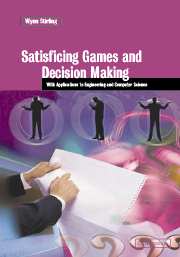5 - Uncertainty
Published online by Cambridge University Press: 12 October 2009
Summary
Solum certum nihil esse certi.
The only certainty is uncertainty.
Pliny the Elder, Historia Naturalis, Bk ii, 7 (1535)The will is infinite and the execution confined …
the desire is boundless and the act a slave to limit.
William Shakespeare, Troilus and Cressida, Act 3 scene 2 (1603)That decision makers can rarely be certain is obvious. The question is, what are they uncertain about? The most well-studied notion of uncertainty is epistemic uncertainty, or uncertainty that arises due to insufficient knowledge. Such uncertainty is usually attributed to randomness or imprecision. The effect of epistemic uncertainty is to increase the likelihood of making erroneous decisions. The worst thing one can do in the presence of epistemic uncertainty is to ignore it. It is far better to devise models that account for as much of the uncertainty as can be described. Consequently, a large body of theories of decision making in the presence of less than complete information has been developed over many decades. I do not propose to give an exhaustive treatment of the way epistemic uncertainty is accounted for under classical decision-making paradigms, but instead summarize two ways to deal with uncertainty. The first is the classical Bayesian approach of calculating expected utility, and the second is the use of convex sets of utility functions.
- Type
- Chapter
- Information
- Satisficing Games and Decision MakingWith Applications to Engineering and Computer Science, pp. 89 - 116Publisher: Cambridge University PressPrint publication year: 2003



